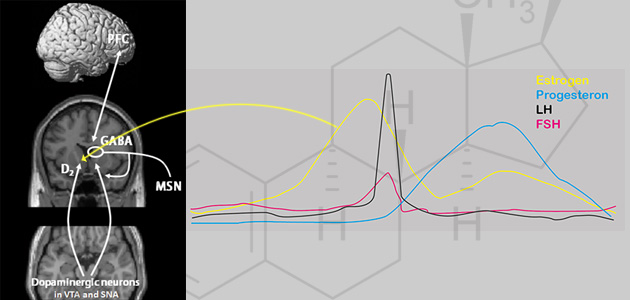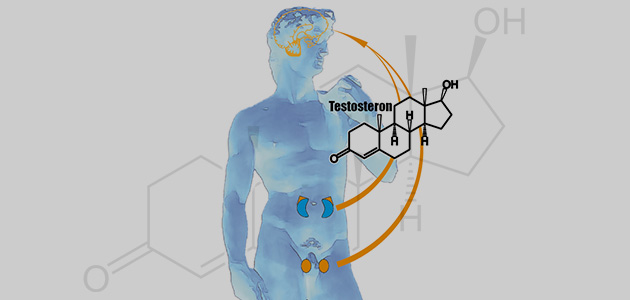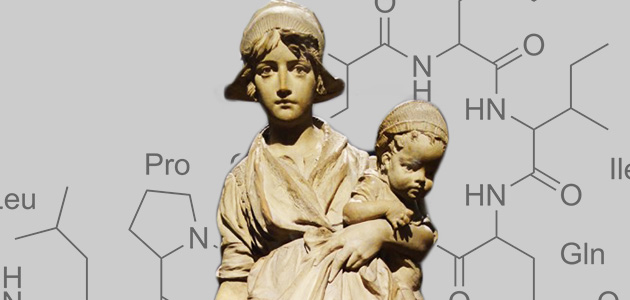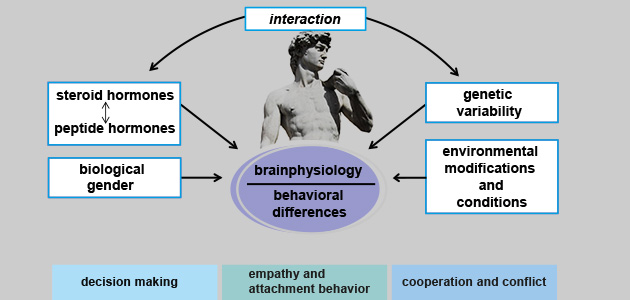Research
How do hormones impact on brain activity, cognitive abilities and behavior in general? And how do sex dimorphic strategies in mate choice depend on differences in endocrine and neurophysiological parameters in particular?
We employ different psychophysiological methods (fMRI, EEG and GSR) to answer these questions and to achieve a better understanding of the mechanisms that shape human behavior and enable cognitive flexibility and adaptive decision-making.
Research projects
Hormonal changes across the menstrual cycle and their influence on reinforcement learning and reward processing
Hormonal changes across the menstrual cycle and their influence on reinforcement learning and reward processing
(Dr. Esther Diekhof)

The modulatory influence of the sex hormones 17ß-estradiol (E2) and progesterone (PROG) on reward processing, decision-making and the associated neural mechanisms has only recently gained attention in human behavioral and neurocognitive research. In the field of reinforcement learning research, processes like probabilistic feedback learning have mostly been assessed in mixed sex groups, without taking sex differences into account. Also, the hormonal variation that occurs between or within subjects, especially in young women of reproductive age, was commonly neglected. This is in so far astounding, since approximately half of the world population is female and women undergo significant hormonal changes during their life-time. With the onset of puberty women transition into a state of recurrent hormonal changes, i.e., the menstrual cycle, and this state lasts for between 30 to 40 years, as long as it is not breached by the intake of hormonal contraceptives, by pregnancy or ultimately by menopause. Moreover, an association between hormonal state and human reward sensitivity could already be demonstrated in some domains. In female substance abusers drugs of abuse were reported to become subjectively more pleasurable during the state of increased E2 in the follicular phase of the menstrual cycle, and craving of the preferred drug and the risk for relapse increased concurrently. In contrast, the rise in natural PROG during the second half of the menstrual cycle had the opposite effect on addictive behaviors. The same hormones may also maintain the neural integrity of the reward system during aging. In early menopause, when natural E2 is abruptly depleted, the treatment with both synthetic E2 and PROG, that followed a schedule mimicking the natural menstrual cycle, restored reward-related brain activation to pre-menopausal levels. In light of these observations it appears reasonable to assume an influence of menstrual cycle related changes in hormonal state on the different aspects of reinforcement learning.
The focus of the first research field lies on the influence of cycle-dependent changes in E2 and PROG level on reinforcement learning capacity, to close an important gap in previous menstrual cycle research. For this we use a number of well-established reinforcement learning tasks, e.g., probabilistic feedback learning, temporal response adaptation for reward, reversal learning, also in combination with neuroimaging.
Relevant publications:
Diekhof, EK (2018). Estradiol and the reward system in humans. Current Opinion in Behavioral Sciences, 23: 58-64. Part of the Research Topic “Gender Differences in the Brain”
Jakob K, Ehrentreich H, Holtfrerich SKC, Reimers L, Diekhof EK (2018). DAT1-Genotype and Menstrual Cycle, but Not Hormonal Contraception, Modulate Reinforcement Learning: Preliminary Evidence. Frontiers in Endocrinology, 9: 60. Part of the Research Topic “Steroids and the Brain”
Diekhof, E.K. (2015). Be quick about it. Endogenous estradiol level, menstrual cycle phase and trait impulsiveness predict impulsive choice in the context of reward acquisition. Horm. Behav. 74, 186-93
Reimers, L., Büchel, C., Diekhof, E.K. (2014). How to be patient. The ability to wait for a reward depends on menstrual cycle phase and feedback-related activity. Front. Neurosci. 8, 401
Effects of testosterone on social cognition in men cooperation and conflict
Effects of testosterone on social cognition in men cooperation and conflict
(Dr. Esther Diekhof)

The second research field aims to investigate how the steroid hormone testosterone modulates decision-making processes, mainly in the context of social cognition (e.g., cooperation, altruism) and focusing on male social-cognitive processes. Previous research in different species has already demonstrated that endogenous testosterone levels are often positively correlated with aggressive and dominant behaviors in males. According to the “Challenge Hypothesis”, which was initially proposed by Wingfield, testosterone levels increase in socially instable periods (e.g., in phases of high intrasexual competition for territories), which promotes aggressive behavior in competitive interactions. In contrast to that, testosterone levels decrease in socially stable periods, during which there are less competitive interactions with same-sex conspecifics (e.g., during breeding season).
Initial evidence from humans also point to a promoting effect of testosterone on aggression, dominance and risk-taking behavior, which might suggest that testosterone generally facilitates rather antisocial, aggressive behavioral tendencies. However, this assumption does not always hold true. For instance, the aggressive act of punishing an unfair opponent in a game theoretic decision task can also be altruistic and thus indicate rather prosocial behavior. This applies to situations, in which the punishment involves personal costs (i.e., investing financial resources in order to punish unfair behavior of a third person) and increases the probability that group members behave fair and more cooperative in future interactions.
Moreover, the aggressive defense of a group against external threats may not necessarily indicate antisocial behavior since it may help to sustain resources and ensure the survival of the group (“parochial altruism”). Given that testosterone may play an important role in evolutionary mechanisms based on group selection by facilitating prosocial behaviors in specific contexts. In humans this could be particularly relevant in situations of increased (intrasexual) competition between groups for resources. The main goal of the second research field is to investigate this specific role of testosterone, especially in the context of game theoretic decision tasks. Moreover, it is currently unknown how testosterone may modulate the underlying neuronal mechanism to exert the expected effects on social behavior in men.
The main questions of the second research field are:
- Is there an association between testosterone and aggressive behaviors, which are directed against other and competing groups and aim to sustain resources of the own group? Or does testosterone promote aggression in general?
- Does testosterone promote altruistic punishment of unfair behavior within the own group or also between groups? And how does a competition context affect this link?
- How is this modulating effect of testosterone on behavior manifested in the human brain?
Relevant publications:
Reimers L, Büchel, C, Diekhof EK (2017). Neural substrates of male parochial altruism are modulated by testosterone and behavioral strategy. NeuroImage. 156: 265-276. doi: 10.1016/j.neuroimage.2017.05.033
Reimers, L., Diekhof, E.K. (2015) Testosterone is associated with cooperation during intergroup competition by enhancing parochial altruism. Front. Neurosci. 9, 183Reimers, L., Büchel, C., and Diekhof, EK (2014). How to be patient. The ability to wait for a reward depends on menstrual cycle phase and feedback-related activity. Front. Neurosci. 8, 401. doi:10.3389/fnins.2014.00401.
Diekhof, E.K., Wittmer, S., Reimers, L. (2014) Does competition really bring out the worst? Testosterone, social distance and inter-male competition shape parochial altruism in human males. PLoS. One. 9, e98977
Influence of testosterone and oxytocin in female social cognition
Influence of testosterone and oxytocin in female social cognition
(Dr. Sarah Holtfrerich, Dr. Esther Diekhof)

The third research field is focused on the influence of exogenous oxytocin and endogenous testosterone in the processing of infant faces. In detail, we are interested in how these hormones modulate attention and reward processes in the context of caretaking behaviors in the female brain. Further, we are interested in the response to infant faces with different degrees of baby schema. So far, research on a possible interplay between both hormones in the processing of baby schema remains elusive.
Konrad Lorenz firstly described the baby schema as a combination of typical child characteristic features like big eyes, chubby cheeks and a round head shape. As an adaptive mechanism that automatically releases caretaking behaviors the baby schema could enhance reproductive success. In this case, the baby schema should not only evoke positive emotional reactions, but may also lead to prioritized attention since stimuli with high biological relevance are assumed to be processed preferably by the attentional system.
There already exists some evidence that testosterone seems to antagonize behaviors that are associated with parental care. The decrease of testosterone in young parents could thus be adaptive to increase parental behaviors. Oxytocin, in contrast, is known to positively influence nurturing behaviors and to increase during pregnancy and in postpartum period. The peptide hormone presumably promotes mother-infant-bonding and caretaking behaviors by activations in the reward system of the brain. It has been shown, for instance, that high oxytocin concentrations automatically direct attention towards crying infants through signal changes in the reward system. In the visual modality the baby schema constitutes such key stimulus.
The main questions posed by the research are therefore:
- Which role does testosterone play in the modulation of human caretaking behaviors?
- How do testosterone and oxytocin interact in the female brain and how do both hormones influence human caretaking behaviors?
- How does exogenous oxytocin modulates attention and reward processes in the response to infant faces and is this modulation dependent of the habitual testosterone concentrations?
Relevant publications:
Diekhof, E.K., Reimers, L., Holtfrerich, S.K.C. (2019). Hormonal Modulation of Reinforcement Learning and Reward-Related Processes – A Role for 17ß-Estradiol, Progesterone and Testosterone, in: Schultheiss, O., Mehta, P. (Eds.), Routledge International Handbook of Social Neuroendocrinology. Routledge, London and New York, 420–441.
Holtfrerich SKC, Pfister R, El Gammal AT, Bellon E, Diekhof EK (2018). Endogenous testosterone and exogenous oxytocin influence the response to baby schema in the female brain. Scientific Reports. 8:7672, 1–10. https://doi.org/10.1038/s41598-018-26020-4
Jakob K, Ehrentreich H, Holtfrerich SKC, Reimers L, Diekhof EK (2018). DAT1-Genotype and Menstrual Cycle, but Not Hormonal Contraception, Modulate Reinforcement Learning: Preliminary Evidence. Frontiers in Endocrinology, 9: 60. Part of the Research Topic “Steroids and the Brain
Holtfrerich SK, Schwarz KA, Sprenger C, Reimers L, Diekhof EK (2016) Endogenous Testosterone and Exogenous Oxytocin Modulate Attention Processing of Infant Faces. PLoS One. 2016 Nov 18;11(11):e0166617. doi: 10.1371/journal.pone.0166617. eCollection 2016.
MRT-Study
MRT - Study
(Dr. Esther Diekhof)

Our research project aims to improve the understanding of personal factors that significantly affect social behavior and mental health, particularly during puberty. The focus is on sexual maturation, the menstrual cycle, and ongoing personal changes. Higher stress levels among female students can also increase the burden on teaching staff, thereby indirectly affecting the quality and atmosphere of instruction. Through this study, we aim to contribute to a better understanding of these developments so that girls, their guardians, and teaching staff can approach these topics more consciously in everyday life. To achieve this, we will collect data using validated questionnaires, physiological blood pressure measurements, and hormone concentrations from saliva samples. Additionally, participants will take part in a computer game that involves reaction speed and decision-making processes. This computer game will be conducted in a magnetic resonance imaging (MRI) scanner at UKE, allowing us to simultaneously capture brain function.
Selected Publications:
https://www.uni-hamburg.de/newsroom/forschung/2023/0821-ttp-clusmann-hormone.html

